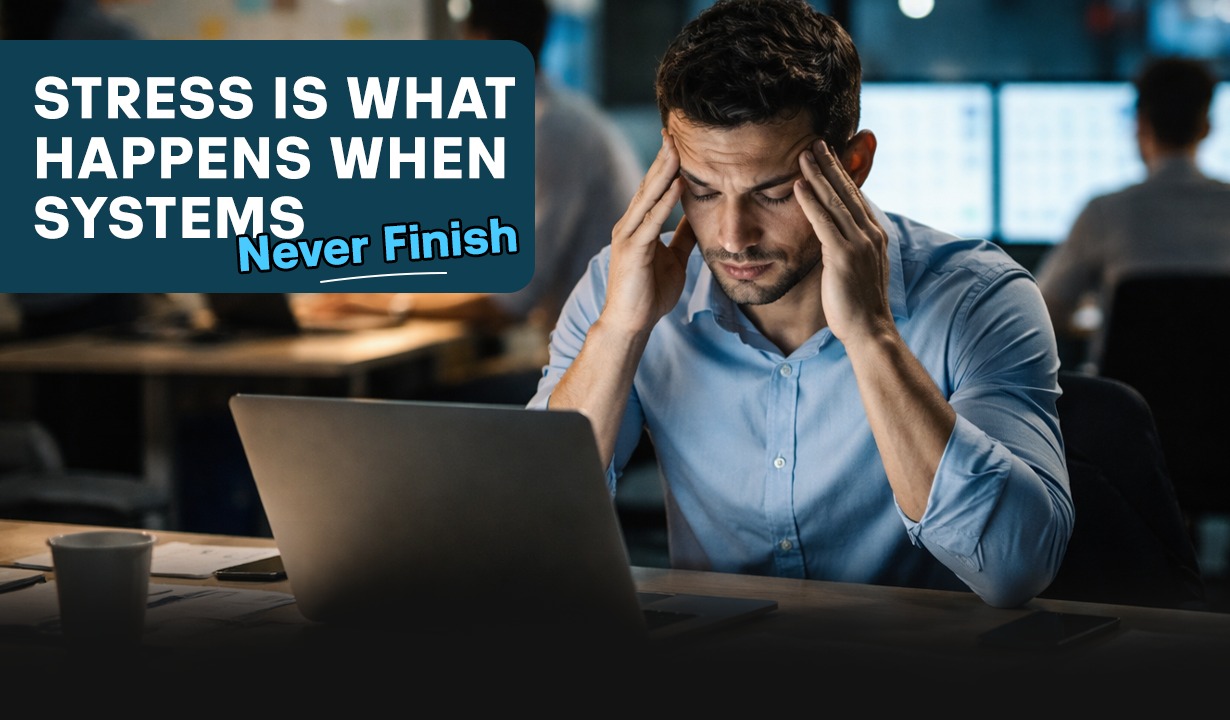We live in a world where exhaustion has become a medal of honor. The guy who brags about sleeping four hours a night is seen as a hero. The woman replying to emails at midnight is celebrated as “committed.” We’ve built a culture that worships sacrifice, not sanity.
And here’s the bitter truth: most of us aren’t just stressed—we’re hooked. This is where stress and productivity addiction blur into one, keeping us trapped in a cycle we mistake for success. Hooked on productivity. Hooked on the rush of being busy, the applause for being “always available,” the validation that comes from being stretched to breaking point.
Stress was supposed to be a warning signal. A red light saying: slow down, recalibrate. Now it’s a lifestyle. If you’re not exhausted, you feel guilty. If you dare to rest, you feel behind.
How Workplaces Feed the Addiction
Inside organizations, stress and productivity addiction are celebrated—people are pushed to constantly prove themselves, not through creativity, but through how much they can endure.
- Saying “yes” becomes survival. The more you accept, the more you’re respected. Refuse, and you’re marked as “not a team player.”
- Mental space is hijacked. Even at dinner, in the shower, or lying in bed, your head spins with tasks that refuse to shut up.
- Physical limits are ignored. People drag themselves through fatigue, telling themselves this is what success looks like.
The system claps while your nervous system crashes. And slowly, you lose the ability to even recognize what rest feels like.
The High That Turns Poisonous
Why do smart people fall for this trap? Because productivity gives a high. But that high is short-lived, fueling stress and productivity addiction that keeps you craving more tasks, more hours, more applause.
It feels good—until it doesn’t. Because the high fades. And like any addiction, you need more. More projects. More hours. More approval. Soon, you’re not working out of passion—you’re working because silence feels unbearable.
And the applause from others? It’s addictive too. Until you realize applause doesn’t tuck you into bed when your health collapses.
What It Costs
The cost of this obsession is massive.
For individuals:
- You start living in a state of constant depletion—the inevitable result of stress and productivity addiction, where there’s no pause button, only collapse.
- Sleep disappears. Nights are restless, mornings are heavy.
- Food turns into fuel, not nourishment—you either stuff down stress or forget to eat.
The people around you get a ghost version of you. Physically present, emotionally absent.
For organizations:
- Creativity shrivels. When people are always running, they stop imagining.
Good talent quietly leaves. Nobody wants to stay in a machine that grinds them down. - Productivity obsession turns into reputational rot—because employees talk, and the truth gets out.
High performance at this cost isn’t achievement—it’s erosion.
The Wellness Scam
And here’s the irony: organizations know this. But instead of facing it, they create “wellness theater.”
A Friday yoga class. A token meditation app subscription. A motivational email during Mental Health Week.
It looks good on the surface, but it doesn’t touch the core problem—the system is addicted to extraction. These gestures aren’t solutions; they’re painkillers. And painkillers never cure.
Breaking the Loop
So how do we break it?
As individuals:
You have to ask the ugly question: Am I genuinely working, or am I just terrified of stopping? Because sometimes “productivity” is just avoidance dressed up as ambition. And your nervous system is the collateral.
As leaders:
Stop celebrating exhaustion as loyalty. Stop mistaking collapse for commitment. Build spaces where recovery isn’t optional—it’s normal. Not through policies pasted on the intranet, but through lived practice: allowing pauses, respecting boundaries, and acknowledging that performance without well-being is a hollow victory.
The Real Price
High performance always comes at a price. The question is: what currency are you paying with?
If it’s your health, your clarity, your family, your peace of mind—then you’re not high performing. You’re just enslaved to a drug called productivity.
And like every drug, it doesn’t end with a win. It ends with a crash.
So, before you chase that next round of applause, ask yourself: Am I stressed—or am I caught in the trap of stress and productivity addiction, mistaking exhaustion for achievement?
Because one can be healed. The other will quietly strip you of everything, while the world keeps clapping.
Let’s Connect!


